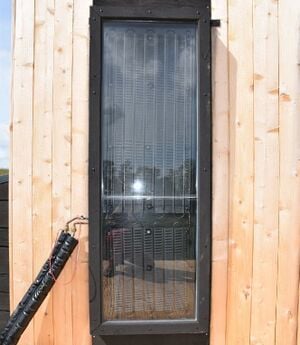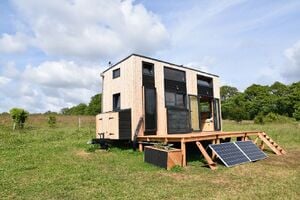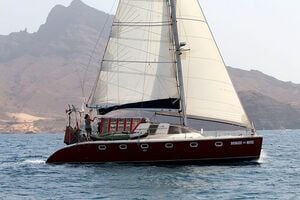
The Low-tech lab is a French institution focused on useful, accessible and durable innovation. Their wiki contains over 50 low-tech solutions using a Creative Commons License.
Definition of “Low-Tech”[edit | edit source]
Criterias[edit | edit source]
"Low-tech" are technologies, services and know-how that meet the following criteria:
- USEFUL : A low-tech meets essential needs in the fields of energy, food, water, waste management, construction materials, housing, transport, hygiene or health.
- SUSTAINABLE : Robust, repairable, recyclable, it is designed to ensure that its ecological and social impact is optimal from production, distribution, use until the end of its life.
- ACCESSIBLE : Unlike high-tech, its cost and technical complexity are not prohibitive for a large part of the population.
Beyond the technologies, “low-tech” can be considered as a more general approach leading to ask these questions: Why do we produce? What do we produce? How do we produce?

Examples of low-tech[edit | edit source]
- Solar water heater: this low-tech allows to save up to 80% of the energy required to heat water in a house. It is made of recycled components.
- Plastic pyrolizer: plastic pyrolysis produces fuel from plastic waste through distillation.
- Black soldier flies breeding: transforms organic waste into fertilizer and animal proteins.
- Desert Fridge: keeps food fresh without electricity, thanks to water evaporation.
- Semi-removable mass stove: high yield stove that provides heat during a long time.
Tutorials allowing to build these technologies can be found on the Low-tech Lab’s website.
Insight and mission of the Low-tech Lab[edit | edit source]
The Low-tech Lab is an association that believes in the power of useful, accessible and sustainable innovation to meet the challenges of today and tomorrow: low-tech offers everyone and everywhere the means to meet their needs while respecting Humans and the Planet.
Thus, exploring these questions is essential for the Low-tech Lab:
- How can we make as many people as possible want and able to enjoy a sober lifestyle in harmony with the environment?
- How to consume, produce and create in a simple and responsible way?
- How can we make appropriate technological choices that contribute to a world where everyone can be an actor?
- How can we facilitate and contribute concretely the change, the societal transition and a progress oriented at the level of individuals and communities?
The Low-tech Lab's mission is to share solutions and low-tech spirit with as many people as possible, in order to enable everyone to meet their basic needs in an autonomous and sustainable way. Since 2013, more than 50 technologies have been identified, tested, documented and disseminated in open source via our collaborative platform.
What does the Low-tech Lab do?[edit | edit source]
Main programs[edit | edit source]
Concretely, this mission is embodied through 3 different dimensions:
- Experimentation and inspirational projects: they aim to prove the relevance of low-tech in different contexts and areas. These feedback and testimonies raise awareness by showing that alternatives solutions are possible and already exist.
- Low-tech Lab communities: animation and support of individuals and projects in Brittany, France or abroad who are involved in the discovery, sharing and promotion of low-tech around them.
- Low-tech Explorer program: support for explorers who meet low-tech pioneers and discover their solutions. They make these innovations accessible thanks to open-source documentation.

Inspirational programs[edit | edit source]
Low-tech Lab’s main inspirational projects:
- Nomade des mers/Sea Nomad: Around the world aboard a laboratory boat to identify, experiment, document and disseminate low-tech innovations. Over the past 4 years, it has made stops in 17 countries and allowed the study of more than 40 low-tech products, among which energy production systems, waste treatment and recycling tools, water filtration systems …
- Low-tech housing: After a year on the roads of France, the Low-tech Tour France team is experimenting with a micro-habitat combining 12 low-techs adapted to the Western context. It will make it possible to assess the impact of these solutions on the environment, our economies and our comfort before their wider dissemination.
History of the Low-tech Lab[edit | edit source]
2013-2016 : Gold of Bengal[edit | edit source]
During his engineering studies, Corentin de Chatelperron realizes an internship in a shipyard in Bengladesh called Tara Tari. There he develops a material based on a reinforced composite made from natural jute fiber. In order to prove this material potential for shipbuilding, he decides to build Tara Tari, a small sailboat made with 40% of natural jute fiber reinforced composite, and sails from Bengladesh to France with it.
After 6 months of navigation and many adventures, the Tara Tari expedition is a real success. It allows to gather partners and launch a research project on jute fiber in Bengladesh. A production line for jute-based fabric is set, and the team challenges itself with building a new boat, this time entirely made from natural fibers.
In 2013, Corentin sets a new expedition to test Gold of Bengal, the first sailboat 100% built from jute fibers. His goal is to live autonomously on the boat for 6 months. He takes on board a greenhouse, a manual desalinator, a solar oven, a wood burning stove, and even two hens! After 5 months, he stops on the island of Tambarat, where he experiments new low-tech systems with his team: hydroponic culture, coconut coal, plastic bottles recycling, etc …
Since 2016 : Low-tech Lab[edit | edit source]

The autonomous adventure on board Gold of Bengal leads the team to reflect upon progress and the potential of simple and sustainable technologies: low-techs. They realize that only few researches exist to optimize these technologies or to invent new ones. The Low-tech Lab is born: a wide research and collaborative documentation program about low-technologies.
On the 23rd of February 2016, the Sea Nomad leaves the port of Concarneau (France) for 4 years of exploration around the world, looking for the most promising low-techs. On board this laboratory catamaran, Corentin and his team experiment and document the discovered low-techs.
In 2017, the Low-tech Lab creates their “low-tech Wikipedia”, referencing all the discovered low-techs, and allowing an open-source access to their tutorials. In order to promote “incremental innovation” all the work realized by the Low-tech Lab is under Creative Commons licenses.
Alongside the worldwide identification of low-techs performed by the Sea Nomade, a second project aims to discover and experiment low-techs for an occidental habitat. After the Low-tech Tour in France, the Low-tech Lab realized a 1-year experimentation living in a micro-habitat almost entirely supplied with low-techs.
How to take part in the Low-tech Lab ?[edit | edit source]
- Build a low-tech using the Low-tech Lab's tutorials and share your realization and experience, creating an Appropedia article or on the Low-tech Lab website.
- Become a Low-tech Explorer.
- Participate in referencing low-tech organizations around the world: this map shows what has already been found. By filling this form, you can add the organizations that you know and help other people to find them
- Participate in translating some of the tutorials: follow English guide and Dossier traducteurs to help with this task and check https://www.appropedia.org/File:Languages_for_tutorials_-_Written_and_Video.pdf and https://www.appropedia.org/File:Languages_for_tutorials_-_Video.pdf for languages needed.